2020中考英语语法专题复习:名词
- 格式:ppt
- 大小:2.66 MB
- 文档页数:107
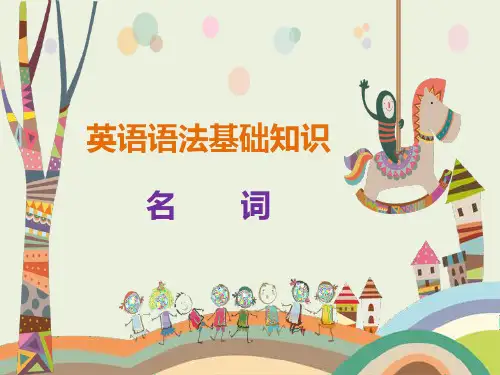
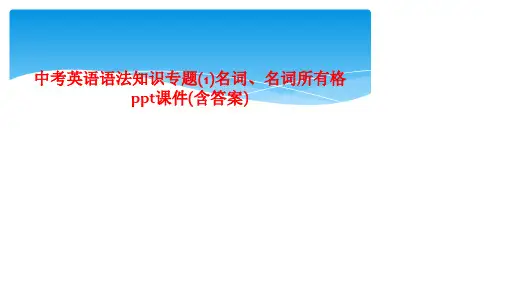
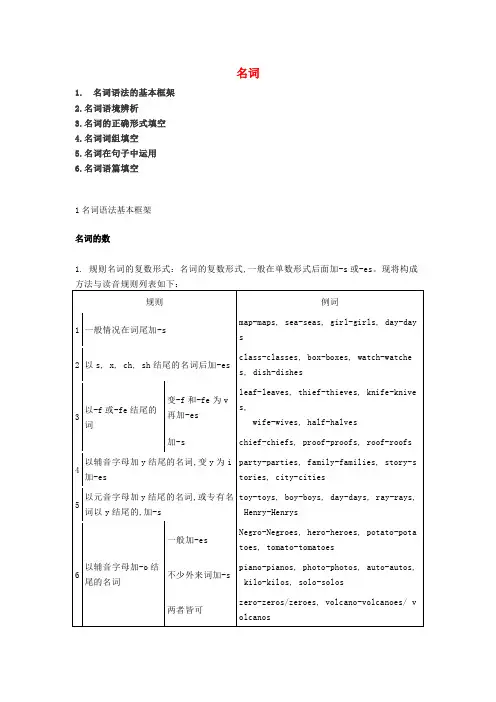
名词1. 名词语法的基本框架2.名词语境辨析3.名词的正确形式填空4.名词词组填空5.名词在句子中运用6.名词语篇填空1名词语法基本框架名词的数名词的所有格名词单复数的判断1.如何判定是可数名词还是不可数名词①可数名词有单数和复数两种形式,如:desk,desks;②可数名词前面可以被基数词,不定冠词(a/an),many修饰,如:three boys,an apple, many students。
2.如何判定是不可数名词①不可数名词没有复数形式,如:tea,meat;②不可数名词,若表示数量,可用量词加不可数名词,如:a piece of paper, two cups of tea。
3. 常见的名词修饰词①只修饰可数名词的修饰语few 几乎没有a few 有几个several 有几个many 很多a couple of 两个a number of 若干a great/large number of 许多②只修饰不可数名词的修饰语little很少,几乎没有a little有一点儿much很多a good/great deal of很多a bit of有一点儿a large amount of大量的③既可修饰可数名词又可修饰不可数名词的修饰语some 一些a lot of 很多lots of 很多plenty of 充足的enough 足够的most 大多数的hardly any 几乎没有the rest of 剩下的名词拓展1.voice, noise, soundvoice指人的说话声或唱歌声,指人的“嗓音”;noise是“吵闹声、噪音”,指不悦耳的声音;sound指自然界中的任何声音。
2.work与jobwork是不可数名词,指需花费体力和脑力的工作;job是可数名词,多指“零工”或“短工”。
例:a part-time job一份兼职工作;out of work 失业3.family, home, housefamily强调整体,指“家、家庭”时,谓语动词用单数;强调个人,指“家庭成员”时,谓语动词用复数;不用于指住房。
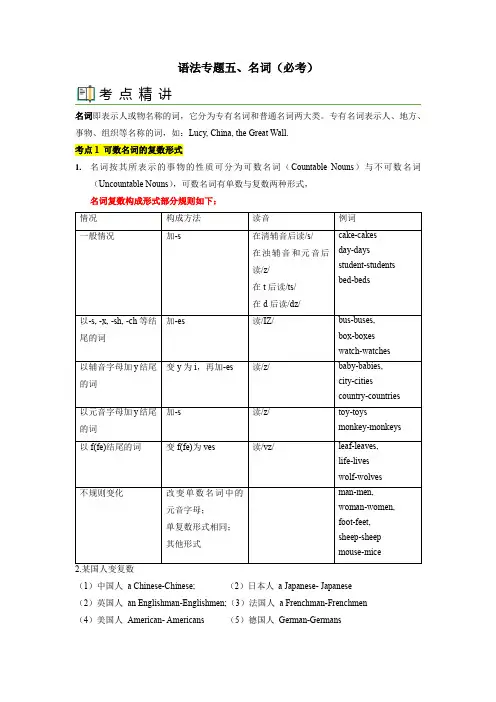
语法专题五、名词(必考)名词即表示人或物名称的词,它分为专有名词和普通名词两大类。
专有名词表示人、地方、事物、组织等名称的词,如:Lucy, China, the Great Wall.考点1 可数名词的复数形式1.名词按其所表示的事物的性质可分为可数名词(Countable Nouns)与不可数名词(Uncountable Nouns),可数名词有单数与复数两种形式,名词复数构成形式部分规则如下:情况构成方法读音例词一般情况加-s在清辅音后读/s/在浊辅音和元音后读/z/在t后读/ts/在d后读/dz/cake-cakes day-days student-students bed-beds以-s, -x, -sh, -ch等结尾的词加-es读/IZ/bus-buses,box-boxeswatch-watches以辅音字母加y结尾的词变y为i,再加-es读/z/baby-babies,city-citiescountry-countries以元音字母加y结尾的词加-s读/z/toy-toysmonkey-monkeys以f(fe)结尾的词变f(fe)为ves读/vz/leaf-leaves,life-liveswolf-wolves不规则变化改变单数名词中的元音字母;单复数形式相同;其他形式man-men, woman-women, foot-feet, sheep-sheep mouse-mice2.某国人变复数(1)中国人a Chinese-Chinese; (2)日本人a Japanese- Japanese (2)英国人an Englishman-Englishmen;(3)法国人a Frenchman-Frenchmen (4)美国人American- Americans (5)德国人German-Germans 考点精讲可用口诀记忆这一点,即:中日不变英法变,其余s加后面。
3.以-o结尾的名词,有些在词尾加-es,它们是“黑人英雄爱吃西红柿土豆”。
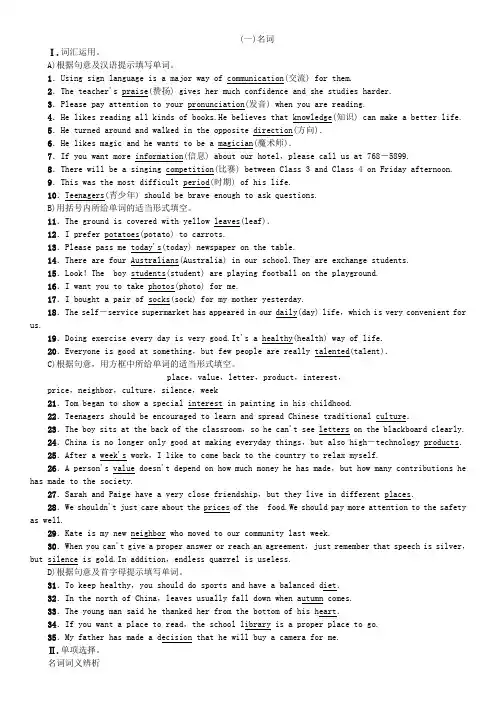
(一)名词Ⅰ.词汇运用。
A)根据句意及汉语提示填写单词。
1.Using sign language is a major way of communication(交流) for them.2.The teacher's praise(赞扬) gives her much confidence and she studies harder.3.Please pay attention to your pronunciation(发音) when you are reading.4.He likes reading all kinds of books.He believes that knowledge(知识) can make a better life.5.He turned around and walked in the opposite direction(方向).6.He likes magic and he wants to be a magician(魔术师).7.If you want more information(信息) about our hotel,please call us at 768-5899.8.There will be a singing competition(比赛) between Class 3 and Class 4 on Friday afternoon.9.This was the most difficult period(时期) of his life.10.Teenagers(青少年) should be brave enough to ask questions.B)用括号内所给单词的适当形式填空。
11.The ground is covered with yellow leaves(leaf).12.I prefer potatoes(potato) to carrots.13.Please pass me today's(today) newspaper on the table.14.There are four Australians(Australia) in our school.They are exchange students.15.Look!The boy students(student) are playing football on the playground.16.I want you to take photos(photo) for me.17.I bought a pair of socks(sock) for my mother yesterday.18.The self-service supermarket has appeared in our daily(day) life,which is very convenient for us.19.Doing exercise every day is very good.It's a healthy(health) way of life.20.Everyone is good at something,but few people are really talented(talent).C)根据句意,用方框中所给单词的适当形式填空。
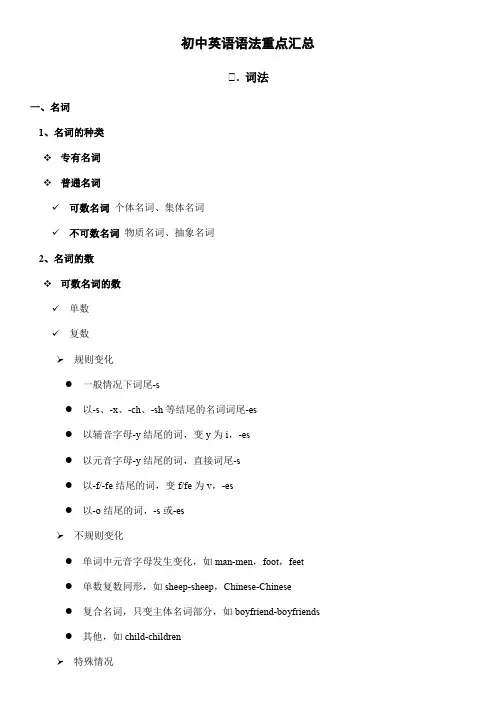
初中英语语法重点汇总Ⅰ. 词法一、名词1、名词的种类❖专有名词❖普通名词✓可数名词个体名词、集体名词✓不可数名词物质名词、抽象名词2、名词的数❖可数名词的数✓单数✓复数➢规则变化●一般情况下词尾-s●以-s、-x、-ch、-sh等结尾的名词词尾-es●以辅音字母-y结尾的词,变y为i,-es●以元音字母-y结尾的词,直接词尾-s●以-f/-fe结尾的词,变f/fe为v,-es●以-o结尾的词,-s或-es➢不规则变化●单词中元音字母发生变化,如man-men,foot,feet●单数复数同形,如sheep-sheep,Chinese-Chinese●复合名词,只变主体名词部分,如boyfriend-boyfriends●其他,如child-children➢特殊情况●只用复数的名词●以-s结尾但并不是复数的名词●集体名词既可以复数,也可以单数●其他❖不可数名词的数✓不可数名词没有复数形式✓有些不可数名词表示具体事物时可数,但意义不同,如chicken,paper3、名词的计量❖可数名词的计量❖不可数名词的计量4、名词所有格❖-’s所有格❖of+名词所有格❖of+-’s 双重所有格❖被名词所有格修饰的名词的省略5、名词在句子中的作用作主语作表语作宾语作宾语补足语作定语作状语作同位语作称呼语二、代词1、人称代词2、物主代词3、反身代词4、相互代词有each other和one another等5、指示代词❖单数:this,that❖复数:these,those6、不定代词❖some和any❖many和much❖both和all❖neither和none❖either、each和every❖another、other(s)和the other(s)✓for another two weeks = for two more weeks ✓some...others...✓one...the other...✓the others = the other +复数❖(a) few和(a) little❖one(s)❖复合不定代词:some-,any-,no-,every-❖复数:these,those7、疑问代词❖指人✓主格:who✓宾格:whom✓所有格:whose❖指物what❖指人或物which8、连接代词who,whom,whose,what,which,whoever,whatever,whichever 9、关系代词who,whom,whose,what,which三、数词1、常见表达法❖日期与时刻✓日期某月某年、某月某日、“月日,年”或“日月,年”✓时刻直接读数表示、用past或to表示❖年龄和年代✓年龄基数词✓年代in the+带有整十的年份的复数或-’s形式❖货币符号+基数词❖编号名词+基数词、the+序数词+名词❖ 小数分数百分数✓ 小数 如three point nine o/zero seven (3.907) ✓ 分数➢ 分子用基数词,分母用序数词,分子大于1时分母序数词后加-s ,如:one third (31),two fifths (52)➢ 分子是2时,常用half ;分子是4时,常用quarter➢ 带分数用“基数词+and+分数”,如:one and two fifths (521)❖ 倍数✓ 倍数+比较级+ than ✓ 倍数+ as +原级+ as ✓ 倍数+ as many/much...+ as...✓ 倍数+ the size/weight/height/length/age...+of... ❖ 约数✓ 大约 about ,nearly ,almost ,some ,around 等 ✓ 超过 over 或more than ✓ 少于 less than ✓ 左右 or so ❖ 算式“+” 用plus 或and ;“-”用minus ;“×”用times 或multiplied by ;“÷”用divided by 2、数词的句法功能❖ 作主语 Twenty of them are from Chonqing. ❖ 作宾语 I like the third best. ❖ 作表语 He is twelve.❖ 作定语 Tom is the tallest of the three boys. ❖ 作状语 Where did you first meet him?❖作同位语We two will help you.3、数词的构成和用法❖基数词✓100以内基数词✓100以上基数词❖序数词✓1~3,4~19✓20~90整十位数✓21以上✓一百、一千、一百万四、介词1、介词的分类简单介词、合成介词、双重介词、短语介词2、介词的位置常规位置、其他位置3、介词短语❖构成介+名,介+代,介+数,介+动名,介+疑问词+不定式,介+从句❖作用作定语、作状语、作表语、作宾语补足语4、介词固定搭配介词与名词、介词与动词、介词与形容词、介词与副词、介词与过去分词5、常见介词用法❖表示时间✓at,in,on✓since,for✓after,in✓by,until/til✓before,after✓from✓during❖表示地点、方位✓at,in,on,to✓on,over,above,under,below✓beside,by,near,nearby,next to,around ✓inside,outside✓into,onto,out of,off✓across,through,past,over,along,down ❖表示方式手段工具✓in,on,by✓in,by,with❖其他✓on,about✓except,except for,besides ✓between,among✓of✓like ✓with✓without ✓for✓as✓against五、冠词1、冠词的用法❖定冠词✓特指的✓谈话双方都知道的✓上文提到的✓独一无二的❖不定冠词✓一类中的任意一个✓第一次谈到✓一类人或物✓数量“一”✓每一,相当于every❖不用冠词✓已有定语✓不可数或复数表一类✓三餐、球类、学科2、冠词的位置❖定冠词❖不定冠词3、有无冠词的区别❖go to school 去上学/ go to the school 到学校去(不一定是学生)❖on earth 究竟/ on the earth 在地球上❖next year 明年/ the next year 第二年❖at table 在吃饭/ at the table 在桌子旁边❖by sea 乘船/ by the sea 在海边❖in bed(睡、病、躺)在床上/ in the bed (某物)在床上❖in class 在上课/ in the class 在班上❖in front of 在(……外部的)前面/ in the front of 在(……内部的)前面六、连词1、按形式简单连词、关联连词、短语连词2、按功能❖并列连词✓表并列and,both...and...,neither...nor...,not only...but also...,as well as✓表转折but,while,yet✓表选择either...or...,or✓表因果so,for❖从属连词✓引导名词性从句主语从句、宾语从句、表语从句、同位语从句✓引导状语从句时间状语、条件状语、原因状语、目的状语、让步状语、结果状语、地点状语、比较状语、方式状语七、副词1、副词的种类时间、地点、频度、方式、程度、疑问、关系、连接、其他2、副词的构成形容词+-ly,与形容词同形3、副词的句法功能作状语、作定语、作表语、作补足语4、副词在句中的位置时间地点、频度、方式、程度、疑问、关系和连接、地点、修饰句子5、副词的比较等级❖构成✓规则✓不规则❖用法6、副词与形容词比较作用不同、句中位置不同、谓语动词7、常见易混副词辨析❖too,either,also,as well ❖already,yet❖ago,before❖hard,hardly❖late,lately❖very,much,very much ❖too,very,quite❖just,just now❖such,so ❖nearly,almost❖fast,quickly,soon❖too much,much too❖how long,how often,how soon ❖farther,further❖sometimes,sometime❖no,not❖maybe,perhaps❖high,highly八、形容词1、形容词的种类性质形容词、叙述形容词2、形容词的构成❖本身就是形容词❖名词+后缀-y,-ful,-less,-ern,-ly,-n❖复合形容词数词+名词、形容词+名词-ed、形容词+动词-ing、名词+动词-ed、副词+动词-ed3、形容词的句法功能作定语、作表语、作宾语补足语、作状语、作主语或宾语4、形容词的位置❖前置或后置❖排序限定词+数量词+描绘性形容词(大小长短形状新旧颜色)+出处+材料+类别用途+名词5、形容词的比较等级❖构成✓规则变化➢long-longer-longest➢nice-nicer-nicest➢big-bigger-biggest➢easy-easier-easiest➢beautiful-more beautiful-most beautiful✓不规则变化➢good/well-better-best➢bad/ill-worse-worst➢little-less-least➢many/much-more-most➢far-farther/further-farthest/furthest➢old-older/elder-oldest/eldest❖用法✓同级比较、同级比较特殊用法✓比较级、比较级特殊用法✓最高级、最高级特殊用法6、含有形容词的固定短语和句型❖固定短语at,about,for,in,of,to,with ❖常用句子✓It’s + adj. + of sb. to do sth.✓It’s + adj + for sb. to do sth.✓sb. be + adj. + to do sth.7、常见易混形容词辨析❖good,fine,nice,well ❖alone,lonely❖interesting,interested ❖exciting,excited ❖ill,sick❖true,real❖huge,large,big,great ❖pleased,pleasant❖elder,older❖farther,further九、动词1、动词的基本形式动词原形、一般现在时第三人称单数、现在分词、过去分词、过去式2、动词的种类❖行为动词及物动词、不及物动词❖连系动词后跟表语❖助动词无意义,语法需要。
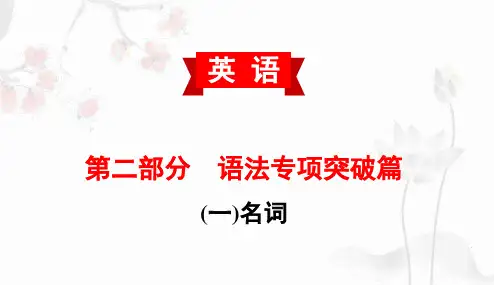
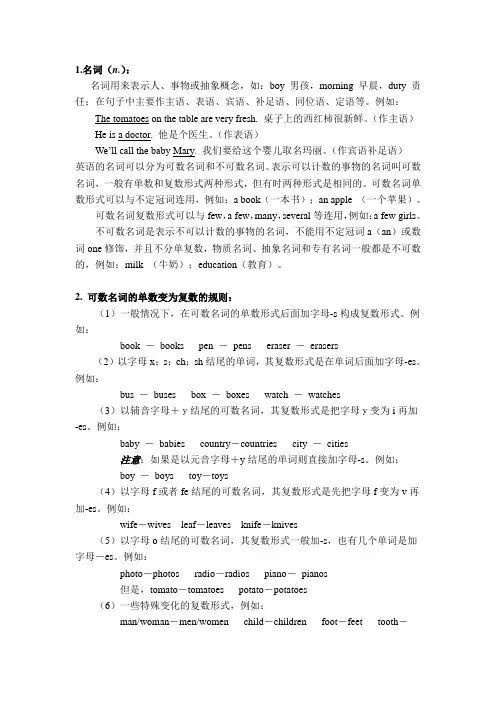
1.名词(n.):名词用来表示人、事物或抽象概念,如:boy 男孩,morning 早晨,duty 责任;在句子中主要作主语、表语、宾语、补足语、同位语、定语等。
例如:The tomatoes on the table are very fresh. 桌子上的西红柿很新鲜。
(作主语)He is a doctor. 他是个医生。
(作表语)We’ll call the baby Mary. 我们要给这个婴儿取名玛丽。
(作宾语补足语)英语的名词可以分为可数名词和不可数名词。
表示可以计数的事物的名词叫可数名词,一般有单数和复数形式两种形式,但有时两种形式是相同的。
可数名词单数形式可以与不定冠词连用,例如:a book(一本书);an apple (一个苹果)。
可数名词复数形式可以与few,a few,many,several等连用,例如:a few girls。
不可数名词是表示不可以计数的事物的名词,不能用不定冠词a(an)或数词one修饰,并且不分单复数,物质名词、抽象名词和专有名词一般都是不可数的,例如:milk (牛奶);education(教育)。
2. 可数名词的单数变为复数的规则:(1)一般情况下,在可数名词的单数形式后面加字母-s构成复数形式。
例如:book -books pen -pens eraser -erasers(2)以字母x;s;ch;sh结尾的单词,其复数形式是在单词后面加字母-es。
例如:bus -buses box -boxes watch -watches(3)以辅音字母+y结尾的可数名词,其复数形式是把字母y变为i再加-es。
例如:baby -babies country-countries city -cities注意:如果是以元音字母+y结尾的单词则直接加字母-s。
例如:boy -boys toy-toys(4)以字母f或者fe结尾的可数名词,其复数形式是先把字母f变为v再加-es。
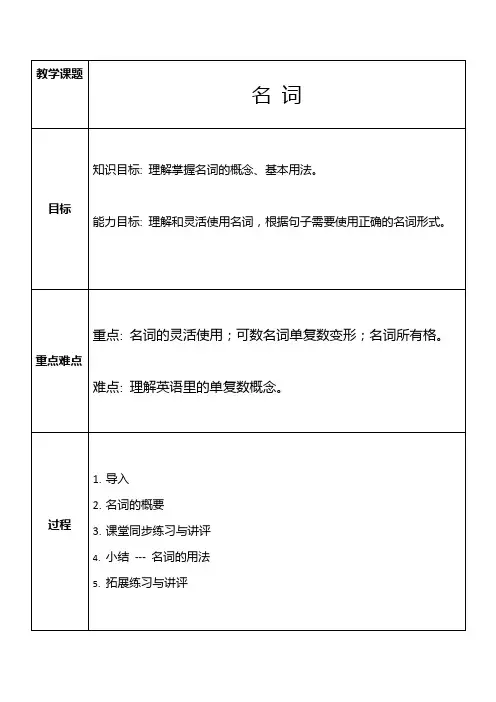
5. Your mother cooks nice __________. I like it very much.A. breadB. beefsC. eggsD. dumplings6.-How can I get some ______ about the 2016 Olympic Games? -Why not search the Internet?A. informationB. experienceC. practiceD. success7.______ about the sports meeting make us excited.A. NewsB. InformationC. MessagesD. Advice8.The Belt and Road initiative(一带一路倡议) will help China improve ______ with lots of countries.A. relationshipB. agreementC. environmentD. progress3.名词的所有格: 在英语中,有生命的名词及表示时间、距离、国家、城市的名词,常在词尾加's 表示所属关系,叫做名词的所有格。
翻译成:"的"。
如:Tom's bike (汤姆的单车)。
名词的所有格例词、例句①直接在词尾加's Kate's bag, Children's Day, Women's Day②以s结尾的名词所有格,在词尾加' Teachers' Day, students' books③表示两人共同拥有的人或物,在后一个人名后加's Lucy and Lily's mother (共同的妈妈)④表示两人分别拥有的人或物,则两个人名后都要加's Tom's and Jim's rooms (各自的房间)⑤表某人的家、店铺、住宅、公共建筑等地名时,所有格后面的名词常常省略at the doctor's(在医务室); at Tom's (在汤姆的家)⑥表示无生命名词的所有格,用of 表达the door of the room, the color of the clothes⑦双重所有格:用's所有格/名词性物主代词与of 所有格相结合。
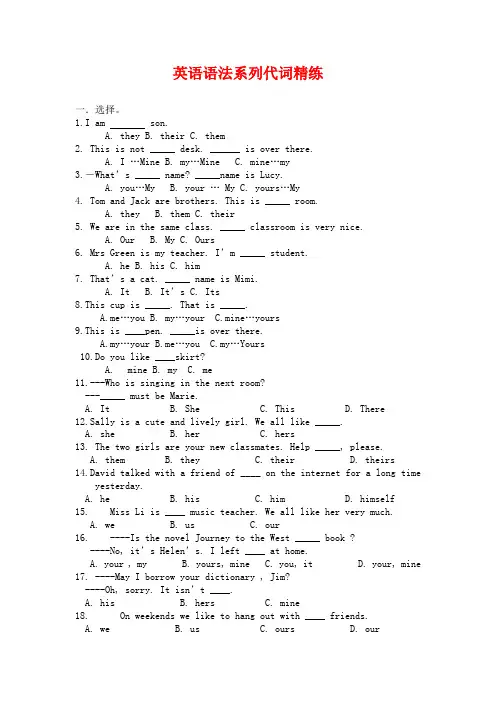
英语语法系列代词精练一.选择。
1.I am son.A. theyB. theirC. them2. This is not _____ desk. ______ is over there.A. I …MineB. my…MineC. mine…my3.-What’s _____ name? _____name is Lucy.A. you…MyB. your … MyC. yours…My4. Tom and Jack are brothers. This is _____ room.A. theyB. themC. their5. We are in the same class. _____ classroom is very nice.A. OurB. MyC. Ours6. Mrs Green is my teacher. I’m _____ student.A. heB. hisC. him7. That’s a cat. _____ name is Mimi.A. ItB. It’sC. Its8.This cup is _____. That is _____.A.me…youB. my…yourC.mine…yours9.This is ____pen. _____is over there.A.my…yourB.me…youC.my…Yours10.Do you like ____skirt?A.mineB. myC. me11.---Who is singing in the next room?---_____ must be Marie.A. ItB. SheC. ThisD. There12.Sally is a cute and lively girl. We all like _____.A. sheB. herC. hers13. The two girls are your new classmates. Help _____, please.A. themB. theyC. theirD. theirs14.David talked with a friend of ____ on the internet for a long timeyesterday.A. heB. hisC. himD. himself15. Miss Li is ____ music teacher. We all like her very much.A. weB. usC. our16. ----Is the novel Journey to the West _____ book ?----No, it’s Helen’s. I left ____ at home.A. your , myB. yours, mineC. you, itD. your, mine17. ----May I borrow your dictionary , Jim?----Oh, sorry. It isn’t ____.A. hisB. hersC. mine18. On weekends we like to hang out with ____ friends.A. weB. usC. oursD. our19.---Excuse me. Have you seen my bike?---Look at that one next to the red bike. Is it _____ ?A. hersB. hisC. yoursD. mine20. ---Whose book is it?---It is _____.A. mineB. yourC. her21.---Is this your pencil case, Tim?---No, it isn’t.. ____ is over there.A. MineB. MyC. MyselfD. I22.This isn’t my dictionary. I left _____ at home.A. myB. mineC. I23.Mr. Wang is very friendly, and ____ like him very much.A. weB. usC. ourD. ours24. An old friend of my sister’s always helps my brother and _____ with _____ English.A. I; ourB. me; ourselvesC. I ; myD. me; our25.---Do you know Alice?----Yes. I know ____ very much.A. sheB. herC. herselfD. hers26. Millie gave _____ a baby cat yesterday that hurt ____ when it fell from the tree.A. me; itB. myself; itselfC. me; itselfD. myself; it27. ---Where is my pen? Have you seen _____ ?--- Oh, sorry. I have taken _____ by mistake.A. it; yoursB. them; hisC. it; mineD. them; hers28. Hurry up! They are waiting for________ .A. weB. usC. our29.----What a nice MP5! Whose is it?----It’s ____. My father bought it for me.A. meB. himC. hisD. mine30. Is there any difference between your idea and _____ ?A. heB. hisC. sheD. her31. ---Bob, Is this your dictionary?---No, it isn’t. Ask Sally. She is looking for _____.A. hisB. hersC. mine32.This is ____ school. I have spent three years studying here.A. meB. myC. mine33.---Is this your key, John?---No, it isn’t. ____ is over there.A. IB. MeC. MyD. Mine34.----Are the keys over there _____ ?----No. Go and ask Anna. They may belong to her.A. youB. yourC. yoursD. yourself35.----Is this kite ____, Tom?----Yes, it’s mine. It’s made by ______.A. yours; myselfB. mine; myselfC. ours; himself36.---Excuse me, are these books ____ ?---No, they are ____ classmate’s.A.his; heB. hers; hersB.C. your; mine D. yours; my37.----Isn’t this MP4 yours, Ben?----No, it’s Jim’s. _____ is left at home.A. MineB. YoursC. HersD. His38.Xiao Shenyang says that _____ job is to make people happy.A. hisB. heC. himD. himself39.His MP3 is the same as ____, but it is more expensive.A. himB. mineC. myD. her40. ----The toy dog in your hand is very nice. Is it _____ ?----Yes, but I’ll give it to my friend Lucy as ______ birthday present.A.you; herB. yours; hersC. yours; herD. you; hers41.When I returned to my hometown, I was nearly lost. Almost_______ hadchanged.A. nothingB. anythingC. somethingD. everything42.I hope I can see the famous man _________ in the future.A. timesB. sometimesC. some timesD. sometime43. Betty is a new student in our class. We know _______ about her except her name.A. somethingB. anythingC. nothingD. everything44. Hello! I have _______ to tell you.A. important somethingB. anything importantC. something importantD. important anything45.—Where is my notebook?—I don’t know. It isn’t here. Maybe ___________ took it away.A. everybodyB. nobodyC. anybodyD. somebody46. Did you find _______?A. unusual somethingB. something unusualC. unusual anythingD. anything unusual47. Would you like ______ to drink?A. other somethingB. something otherC. something elseD. else something48.—Where would you like to go on vacation? —I d like togo .A. somewhere relaxingB. relaxed somewhereC. somewhere relaxedD. relaxing somewhere49.Lucy, I'll give you ______.A. something differentB. different somethingC. anything different50.Is there _____ in the room?A. anything newB. new anythingC. something newD. new something51.We didn’t find in the picture.A. unusual anythingB. nothing unusualC anything unusualD unusual something52.Is there _______ about animals on the Internet?A.special somethingB.something specialC.special anythingD.anything special53.—Who helped Jessie with her English? —_________, she taught herself.A. AnybodyB. SomebodyC.Nobody D. Everybody54.Where's my key? I remember putting it________ in the study.A. everywhereB. anywhereC. somewhere55.On Sunday morning, I want to do _______.A. someone differentB. different somethingC. something differentD. different someone56. — It’s said that the rulers in ancient Europe liked to wearpurple.— That’s interesting. And do you know about colours?A. twice; something elseB. twice; anything elseC. once; something elseD. once; anything else57.— Hi, Mark. I’m new here. Can you tell me about our school?— Of course, Linda.A. somethingB. anythingC. everythingD. nothing58.Ma Li didn’t watch TV last night because there wasn’t on it.A. something interestingB. interesting somethingC. anything interestingD. interesting anything59.—Is _______ ready for the picnic?—No, _______ is wrong with my bike. I can’t go bike riding with you.A. something; somethingB. anything; somethingC. everything; somethingD. anything; everything60.This work needs close teamwork.________will be achieved unless we work well together.A. NothingB. AnythingC. SomethingD. Everything61.Mr. Smith will give us a talk on computers next week.A.attimes B.sometimeC.sometimes D .some times62.They can’t find in our neighborhood.A.somethingstrange B.strange somethingC.anythingstrange D.strange anything63.There’s______with your son’s ears. So don’t worry about him.A.nothingserious B.something seriousC.seriousnothing D.anything serious64.All the students had gone out.There was in the classroom.A.somebodyB.anybodyC.nobodyD.everybody65.There is in today’s newspaper.A something importantB important somethingC anything importantD important anything66. —What are you going to give your mother for her birthday?—I’m not sure. But I’ll buy her _______.A.something specialB. anythingspecialC. special somethingD.special anything67.—Where would you like to visit? — I’d like to go _____.A. relaxing somewhereB. somewhere relaxingC. relaxing anywhere68. of us would agree with you.A.Someone B.Noone C.None D.Nobody69.I asked him for some oil, but he hadn’t .A.some B.any C.anyt hing D.no70.Ben usually goes to Greece for vacation, but this time he wants to do _________.A. different somethingB. anything differentC. something differentD. different anything71.——Look,_____is dancing under the tree.—Oh,that’s my cousin,Anna.A.everybodyB.anybodyC.nobodyD.somebody72.A smile costs_______, but gives much.A. anythingB. somethingC.nothing D. everything73.My grandma tried to cook _________ for us when we lived in her house.A. different somethingB. something differentC. different anythingD. anything different74. “Have you read today's newspaper" “Yes It's really boring. Thereis ______in it.”A. something newB. nothing newC.anything new75. — Did you meet ______ interesting at the party?— Not really.A. anybodyB. somebodyC.everybody D. nobody76. Mike never listens to ______ except his uncle.A. someoneB. no oneC. everyoneD. anyone77._____ of the twins has been there before.A. BothB. NeitherC. allD. None78.If_____ calls, tell_____ I’ll come back soon.A. everyone; himB. someone; themC. anyone; himD. anybody, them79.He told me he would tell us _____ .A. surprising somethingB. surprising anythingC. something surprisedD. something surprising80.Put it down, Tom. You mustn’t read_____ letter.A. else anyone’sB. anyone’s elseC. anyone else’sD. anyone else81. We will have two family parties this autumn.One is at Halloween and is at Thanksgiving.A. otherB. the otherC. ano therD. the others82.We will hav e two family parties this autumn. One is at Halloween and is at Thanksgiving.A. otherB. the otherC. anotherD. the others83.A smile costs ______, but gives so much.A. somethingB. anythingC. nothingD. everything84.—Tom, supper is ready.—I don’t want to eat________ , Mum. I’m not feeling well.A. anythingB. everythingC. somethingD. nothing85. ---Is there __________ in today’s newspaper?---Yes. Germany beat Argentina 1-0 to make history of winning World Cup in America.A. anything newB. new anythingC. something newD. new something86、Boys and girls, I have got ________ to tell you. Please listen to me carefully.A. important somethingB. anything importantC. nothing importantD. something important87、_____ of them has been to Australia several times, so they know the Opera House very well.A. BothB. AllC. NoneD. Each88、—Would you like tea or coffee?—_________ is OK.I really don't mind.A.None B.Either C.Neither D.Both89、—Did you go interesting last week?—Yes, I went to Jinan with my family.A. somewhereB. anywhereC. anythingD. something90、My parents want to go _________ on vacation. They really want a great vacation.A. somewhere peacefulB. dangerous somewhereC. somewhere boringD. fascinating somewhere91.The Rio 2016 Olympic torch(火炬)began _______ 95-day journey in Brazil on May 3rd.A.itB.itsC.it’sD.itself92.A:Which of these three skirts do you like best?B:I’ll take ____. They are all expensive and out of fashion.A.neitherB.bothC.noneD.all93.I like the film “The Martian”best, it _____ shows a lot of imagination,______ has a sense of humor.A.both, andB.neither, norC.not only, but alsoD.either, or94.I will tell you my opinion on keeping pets,and Jane will express _______.A.herB.hersC.sheD.herself95.The twin sisters look so similar that I can’t tell one from_______ .A.othersB.anotherC.otherD.the other96、In 2022, Beijing will host the Winter Olympics. ________ my brother and I want to watch it.A. NeitherB. AllC. EitherD. Both97.I hope there is __________with my eyes.A.wrong nothingB.nothing wrongC.anything wrongD.wrong something98.---I didn’t start well. ---Don’t worry. _____will become easy.A. SomethingB. AnythingC. NothingD. Everything99.This computer is very easy to use. ______ can learn to use it in a very short time.A. SomebodyB. NobodyC. AnybodyD. Few people100.Helen is new here,so we know _______ about herA.Nothing B.Something C.Anything D.everything答案1-5BBBCA 6-10BCCCB 11-15ABABC 16-20DCDCA 21-25ABAAB 26-30CABDB 31-35BBDCA 36-40DAABC 41-45DDCCD 46-50DCAAA 51-55CDCCC56-60DACCA 61-65BCACA 66-70 ABCBC 71-75DCBBA 76-80DBCDC81-85BBCAA 86-90DDBBA 90-95BCCBD 96-100DBDCA。

专题02 名词(可数与不可数、所有格、主谓一致)名词的考察方向:1.可数和不可数2.名词所有格3.名词词义辨析4.主谓一致名词在中考中的主要考查点及考查形式:一)、名词单复数名词的数名词的数主要指普通名词的数。
我们又将普通名词分为可数名词和不可数名词,不可数名词没有复数变化,可数名词有单数和复数之分。
1)可数名词的单数可数名词的单数形式前面一般加冠词a或an,表示“一”的概念。
个字母。
2)可数名词的复数A.Chinese,Japanese,police,people,deer,sheep,fish,口诀:中日警察好友来聚会,鹿、羊、鱼、牛齐齐把家回。
B. 在英语名词复数中,表示(某)国人的名词复数有些加S,有些又不加,学生常常会出错。
这里有一条顺口溜就能帮助学生解决这一问题。
它是:“中日瑞不变,英法都要变,其他国人加S”。
常见国家人的复数形式:C. 极少数单词,其复数形式没有任何规律,可借助口诀帮助记忆goose-geese;mouse-mice;man-men;woman-women;tooth-teeth; foot-feet,child-children另一些名词则以复数词出现的机会较多例clothes衣服;shoes鞋子;sunglasses太阳镜;shorts短裤;scissors剪刀;glasses眼镜;shears大剪刀trousers长裤3)可数名词的数量表达A.可数名词可以借助量词来表达,of后面用名词复数,尤其是成双成对的名词复数。
如:a pair of glasses three pairs of trousers a pair of scissors a pair of trousers a pair of glassesa pair of socks a pair of gloves a pair of shoes可数名词借助量词来表达时要注意:后面虽然用复数,动词要根据前面的量词来决定。
专题04 名词【考点综述】:名词可分为专出名词(包括人名,地名和由一般名词组成的专出名词)和一般名词(包括个体名词,集合名词,物质名词和抽象名词),也可分为可数名词与不可数名词。
专出名词指一个人或事物所特有的名词,如具体的人物,地址,机构,国家或地域的名称等,其中实词的第一个字母大写。
一般名词能够分为可数名词和不可数名词,可数名词也能够分为个体名词,如man, desk, pen 。
集体名词, 如:family, people, police .不可数名词又能够分为物质名词,如,snow, air, water 。
抽象名词,如friendship, knowledge中考英语名词考点:依照近几年全国各地中考试题对名词部份考查的分析可知,尔后对名词部份的考查重点为:名词的可数与不可数性。
名词单复数在特定情形下的利用。
名词的一般格与所有格作定语的选用。
物质名词、抽象名词具体化。
名词词义的区别与固定搭配。
【中考真题再现】:1. 【2021湖北荆州】—Did your mother do anything special on your birthday?—Yes. She made me a cake in the ______ of a heart.A. heightB. shapeC. styleD. number2. 【2021湖北武汉】He will have to watch his ________ because of his serious stomach problem.A. styleB. dietC. smellD. menu3. 【2021江苏扬州】If I am wanted in the telephone, ask him to leave a _________.A. messageB. letterC. diaryD. sentence【答案】A【解析】考词查名辨析。